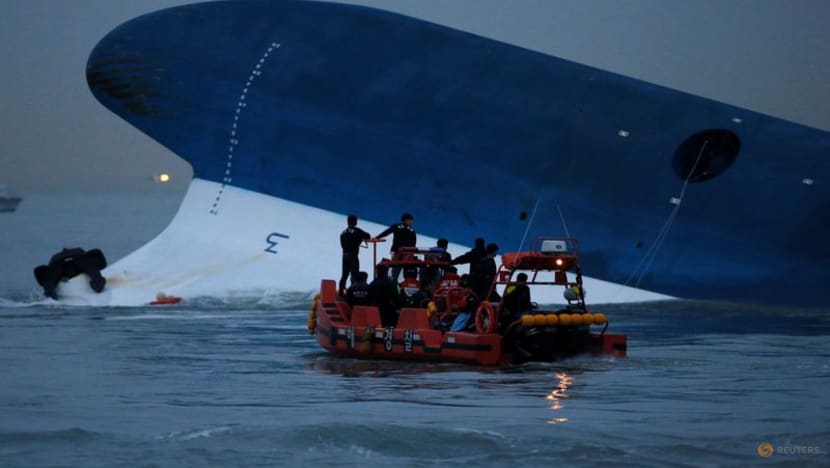Schools in South Korea offer survival swimming lessons following Sewol ferry tragedy 10 years ago
On Apr 16, 2014, the Sewol ferry capsized en route from Incheon to Jeju Island. Out of the 476 people on board, 304 died, mostly students on a school trip.


This audio is generated by an AI tool.
SEOUL: South Korean schools are offering students swimming lessons that equip them with the necessary safety skills to survive, following one of the country's worst maritime disasters.
The course was made compulsory for third- and fourth-graders in the wake of the Sewol ferry sinking 10 years ago.
On Apr 16, 2014, the Sewol ferry capsized en route from Incheon to Jeju Island. Out of the 476 people on board, 304 died, mostly students on a school trip.
The ferry was overloaded and structurally unsound when it sank.
IMPORTANCE OF SURVIVAL SWIMMING LESSONS
Ten years on, the sinking remains fresh in the minds of many South Koreans. The nation has taken various steps to ensure such a tragedy does not happen again.
Swimming coach Park Cheol-soon said the disaster has highlighted the importance of survival swimming lessons.
At some schools, these classes are offered to all their students.
“For the first- and second-grade students, we focus on teaching them to become familiar with water,” said Mr Park.
“Then for the third- and fourth-year students, we teach them how to survive and practise staying afloat in water. And for the older fifth- and sixth-year students, they learn more about the techniques of survival and how to help one another too.”
Students whom CNA spoke to said the lessons are useful in cases of emergency.
One student said: "Just in case there is a situation where I am in danger, I think I can use what I learnt."
Another student said: "If I am drowning, I think I know what to do until help comes."
A DISASTER THAT SHOCKED THE NATION
Ferry services between Incheon and Jeju Island were immediately suspended following the tragedy.
It took seven years before operations resumed. However, this was short-lived – services halted again in April last year.
Mr Lee Sung-no, who runs a convenience store at Incheon port terminal, believes South Koreans simply cannot bring themselves to take the same ferry route after the tragedy, which left citizens in a state of mourning for months.
"The disaster caused huge trauma. People did not even want to utter the word 'Jeju' around here,” he said.
“After a while, (the ferry) business resumed, but it wasn’t doing well. And from what I heard, within about a year, there were incidents of engine failure, frequent failures, and with hardly any customers, the business folded.”
KEEPING THE MEMORIES OF VICTIMS ALIVE
Families of victims and supporters recently held memorials in Seoul, reminding the nation of what happened.
They said it is important to keep the memories of the victims alive, in efforts to make South Korea a safer country.
Ms Park Jung-hwa, who lost her 17-year-old daughter in the disaster, said parents of victims like her felt guilty they could not protect their children. She added that the deadly Halloween crowd crush in Itaewon in 2022 resurfaced this sense of guilt.
“We, parents, really travelled all over to get signatures (for petitions) to raise awareness, making sure children do not become victims again,” said Ms Park.
“We thought we could help make this country a bit safer for our children. And then, the Itaewon crush happened. We realised it is still not safe, and so we need to work harder.”
Related:
TIGHTENING CHECKS ON FERRY SERVICES
The government has designated Apr 16 as National Safety Day to remember the Sewol ferry victims, and promised to create a safer country for all.
Even after a decade, many South Koreans still have vivid recollections of the tragedy.
One South Korean said: "I watched the images on television until the end. I cannot forget them, and I still cannot understand what happened and why there was no help."
Authorities have since tightened checks on ferry services, but public outrage over the tragedy continues to linger.
The ferry's captain Lee Joon-seok was found to have abandoned the sinking ship after telling passengers to stay put.
He is serving a life sentence for murder, while 14 other crew members were jailed between 18 months and 12 years.
















